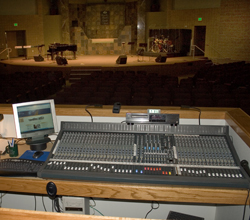
Reply By Pacman
I think the number one concern is proper planning (long term – think five-plus years out) and deciding before purchasing exactly what you want the system/room to do.
In our case, we originally designed the system (11 years old now) for a typical service, which meant a choir, a couple of singers, a piano, perhaps an organ/keyboard for music, and a pastor speaking.
This allowed our contractor to determine what we needed, and the architect also designed the platform to “amplify” acoustic sound with a baffled ceiling (to help the choir sound bigger).
Now we’ve changed in 11 years (as many churches do), running a full band with a small choir – totally different than designed, and we’re paying a price.
We are looking into what we can do to redesign, but if we had looked further out than a couple of years when planning, we would have installed a different system and saved ourselves the issues we have now.
Reply By Willy
If possible, visit other local churches that have the same type of worship environment. Maybe even call ahead of time and speak to someone about the satisfaction level with their current system.
While there, take a good look at the shape of the space. Listen intently as you sit, and if possible, move to different locations or have some other people with you to sit in different places.
After the service is over, make arrangements to talk to the person who dealt with the sound contractor responsible for the system. If you liked what you saw and heard, you’ll have a good head start in the right direction.
I know quite a bit about sound and connections and how things work, but I would not even want to attempt designing something that works in a big, complicated space. It truly takes an expert.
The acoustics are probably the number factor for getting good sound. If this is overlooked, the chances are slim of getting something that functions well.
Reply By CR
We had a set of consultants that we let go, not due to technical knowledge but due to their inability to understand what we were trying to achieve. They were very nice people, they knew their stuff for sure, but they just couldn’t get the church leaders here to “buy into” their vision for our equipment needs.
The second group of consultants spoke our leaders’ “language” and embraced our church’s vision better. We immediately hired them and moved forward.
From my standpoint as the tech director, both companies would give us a quality system, the difference is in the paradigm used.
As a customer, my job was to thoroughly examine what and how we do things here, and communicate that as precisely as possible to the design people.
A gear list isn’t going to do that, you need to try to understand your church’s “culture” at a very deep level. I spent much more time trying to do this than obsessing over which loudspeakers/mixers/mics and etc. that we would need.
The root purpose drives everything else tied to it.
Click here to go directly to the Church Sound Forum.
